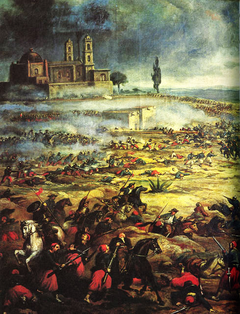May 5, 1862
| Cinco de Mayo | |
|---|---|

|
|
| Observed by | Mexicans, mixed nationality |
| Type | Multinational |
| Significance | Celebration of the Mexican victory over French forces at the Battle of Puebla on May 5, 1862 |
| Celebrations | Parades, food, music, folkloric dancing |
| Date | May 5 |
| Next time | 5 May 2017 |
| Frequency | annual |
| Related to | El Día de la Batalla de Puebla |
Cinco de Mayo (pronounced: [ˈsiŋko ðe ˈmaʝo]; Spanish for "Fifth of May") is a celebration held on May 5. The date is observed to commemorate the Mexican Army's unlikely victory over French forces at the Battle of Puebla on May 5, 1862, under the leadership of General Ignacio Zaragoza.
In the United States, Cinco de Mayo has taken on a significance beyond that in Mexico. In the U.S. the date has become associated with the celebration of Mexican-American culture. In Mexico, the commemoration of the battle continues to be mostly ceremonial, such as through military parades.
In the United States, Cinco de Mayo is sometimes mistaken to be Mexico's Independence Day—the most important national holiday in Mexico—which is celebrated on September 16, commemorating the Cry of Dolores that initiated the war of Mexican independence from Spain.
Cinco de Mayo has its roots in the French occupation of Mexico, which took place in the aftermath of the Mexican–American War of 1846–48 and the 1858–61 Reform War. The Reform War was a civil war which pitted Liberals (who believed in separation of church and state and freedom of religion) against the Conservatives (who favored a tight bond between the Roman Catholic Church and the Mexican State). These wars left the Mexican Treasury nearly bankrupt. On July 17, 1861, Mexican President Benito Juárez issued a moratorium in which all foreign debt payments would be suspended for two years. In response, France, Britain, and Spain sent naval forces to Veracruz to demand reimbursement. Britain and Spain negotiated with Mexico and withdrew, but France, at the time ruled by Napoleon III, decided to use the opportunity to establish a Latin empire in Mexico that would favor French interests, the Second Mexican Empire.
...
Wikipedia
